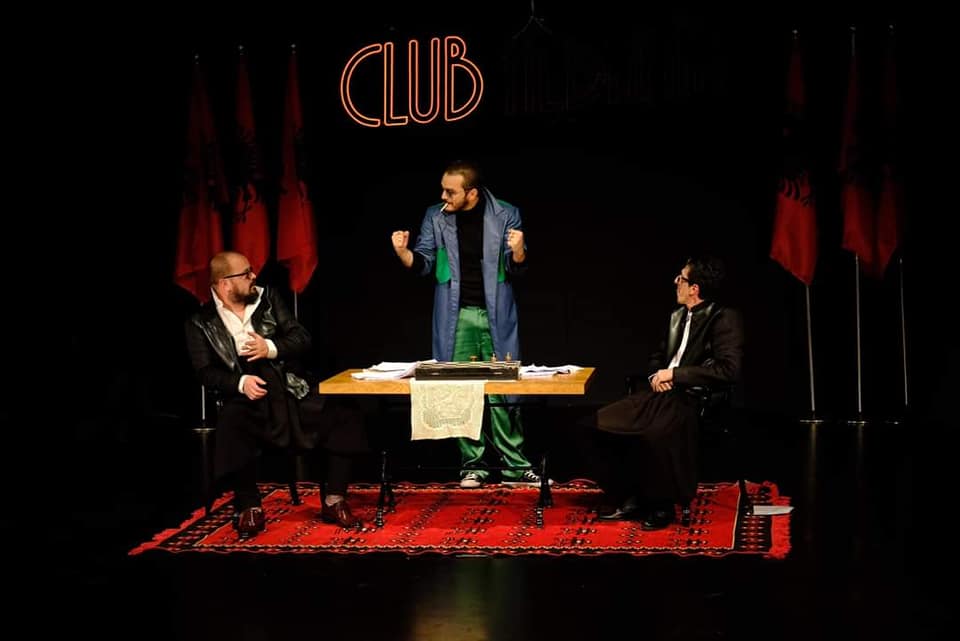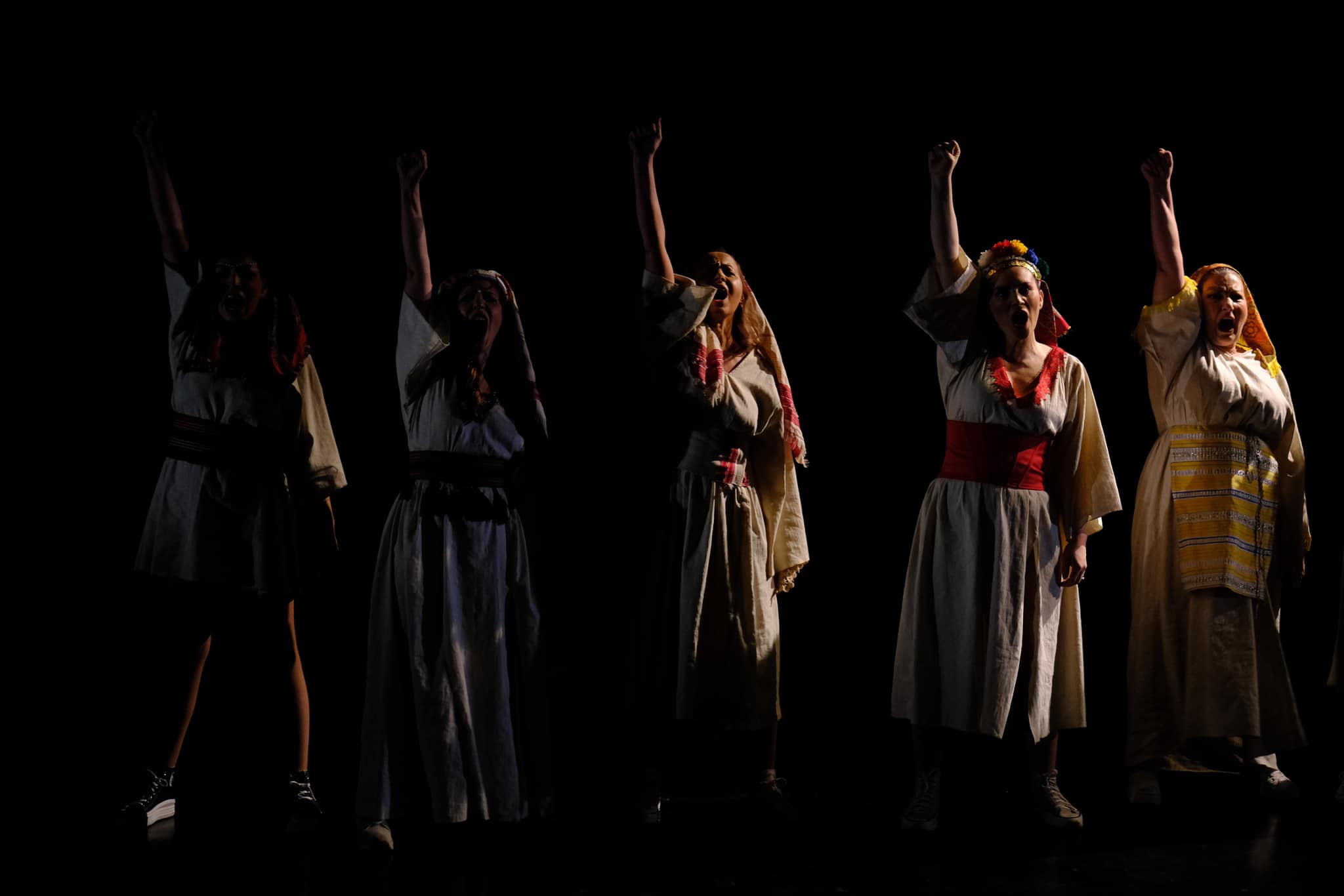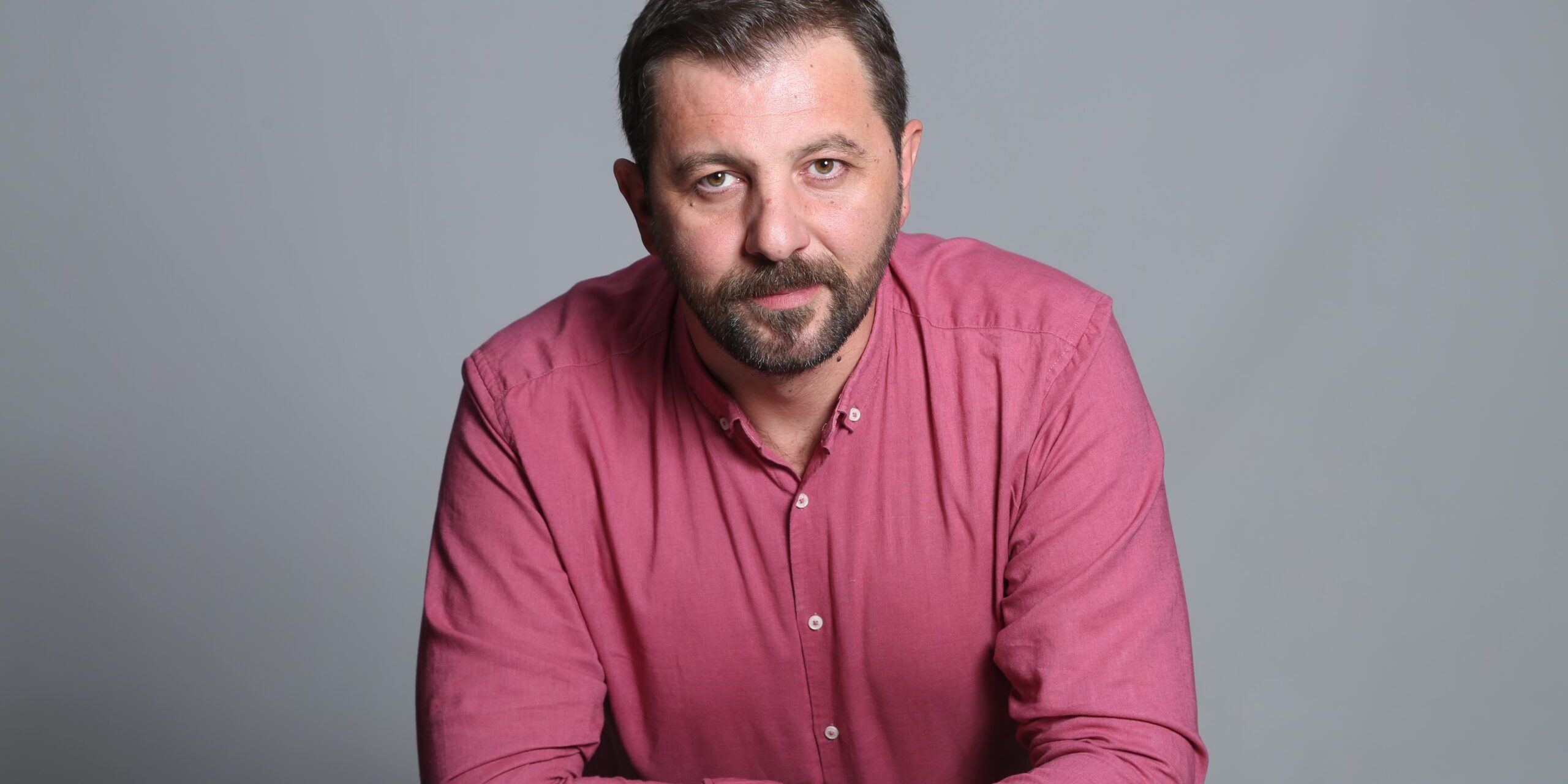As an actor, Kushtrim Sheremeti is a familiar presence on screen in Kosovo and Albania. Appointed general director of the National Theatre of Kosovo in 2022, he talks to Natasha Tripney about post-pandemic cultural challenges and his search for a temporary home for the theatre.
Natasha Tripney: What is the current situation with the National Theatre?
Kushtrim Sheremeti: In Kosovo, as in the rest of the world, 2022 was a hard year for theatre because we were just coming out from the pandemic and the lack of theatre productions during this time means there was a huge risk of losing the audience. Then the National Theatre building was suddenly closed, which is good news in many ways, because renovation was necessary, but it also meant we needed to find a new space.
Natasha Tripney: How old is the building?
Kushtrim Sheremeti: It was built around the Second World War and not originally as theatre, but as a cinema. Even after it was adapted into the National Theatre, the building was lacking the technology. It was lacking a lot of things. It was always hard to produce work and it was getting harder and harder. However, the good news of this renovation came with a price and we needed to find a solution – if we were to survive, we needed to find a new space. So we started searching, with the coordination of the Ministry of Culture, for any public space that was free…
Natasha Tripney: Tell me about the space you eventually found, the amphitheatre at the Palace of Youth?
Kushtrim Sheremeti: This amphitheatre used to be kind of conference hall for young people, when the building was originally built. What’s interesting is that in 2008, I had this space and I opened it [as a theatre]. But it survived only 24 hours. We had just opened it and then someone from the agency for privatisation closed it down the next day, because they said that the papers had not arrived – that we didn’t get permission. We had this grand opening. Ellen Stewart from [New York experimental theatre] La MaMa was here. She made a speech, and she was supposed to do the first premiere. But then it was closed down.
However, a criminal always goes back to the scene of the crime, so I am back at the amphitheatre, this time with the support of the Ministry of Culture in the name of the National Theatre. The space was not in the best condition, but then we got some funding to adapt it. Together with all the staff, we worked hard. We stayed until midnight, until one in the morning sometimes, and in around 14 days, we adapted the whole space. Now the National Theatre of Kosovo has another space – and we believe it will be here forever. We also have a second space that will be turned into a theatre next year. So, we have two spaces. And we hope the original building will be renovated fully by the end of 2024, at least this is the promise that we got from the Ministry of Culture. This is our ambition, but let’s see.
Natasha Tripney: What else are you implementing at the National Theatre?
Kushtrim Sheremeti: We are co- producing work with local theatres in Gjilan and Prizren. In addition to this, along with the National Theatre of Albania and the Albanian Theatre in Skopje, we have realised a long-held dream of co-creating a theatre festival. So, from nothing, we started this new festival of Albanian theatre, [the Moisiu” National Theater Festival], with the support from the three ministries of culture: of Kosovo, of Albania and of North Macedonia. Last year w organized the first edition and it was very successful and really beautiful. At the same time, we were also producing our own work with four premieres, the last one opening in January.
This has only been possible with the love of the staff of National Theatre. This was so important. There is a huge love from them of both theatre and of the National Theatre. And we are friends here, because I didn’t come from the outside. I used to work for years in the National Theatre. With some of the staff, we have grown up together – in a sense of growing artistically. We don’t have a typical organisation in this respect. The artistic programme that we decided to do this year was in the service of the survival of theatre. We wanted to bring back the audience.
And when it comes to the building the audience, we are also working on designing an education program that not only will educate children in theatre but will create new audiences for our theatre when they grow up.

Club Albania at National Theatre of Kosovo
Natasha Tripney: And how are you doing that? Tell me about the choices you’ve made in terms of programming?
Kushtrim Sheremeti: The first premiere, Club Albania, is based on what is considered the very first Albanian comedy, written by Andon Zako, aka Çajupi and conceptually reworked by the director, Fatos Berisha. In the original play, the main subject is how people wish to be remembered after death, which is very important in our society, but the medium was newspaper. Now, 100 years on, the medium is theatre; the play talks about the perception of people in the theatre and what we will remember of them, so this was a really good conceptual choice for the National Theatre.
Natasha Tripney: The play also saw Armond Morina return to the stage after many years.
Kushtrim Sheremeti: Yes. Armond bore the whole of the National Theatre of Kosovo on his back after the war, so the audiences very happy to see him again.
Natasha Tripney: What was the thinking around the next production, Molly?
Kushtrim Sheremeti: We decided to do a play about people with disabilities. The National Theories of Kosovo selected a concept by Sibel Abdiu. She wanted to do a play called Molly, based on a work of Brian Friel {Molly Sweeney, Friel’s 2014 play about a blind woman who regains her sight], which talks about society and how we treat people with disabilities. And at the end of the day, this is the mission of the National Theatre: to raise discussions, to make you think critically. We also had a number of blind audience members who came to that show.
Natasha Tripney: And the next production, Gratë, had an all-female cast and creative team…
Kushtrim Sheremeti: There is this huge discussion worldwide. Why there are not enough good roles for women? Why do men tend to dominate in theatre? We decided to do an all—female show here. I do believe that women in this profession, are if not equal that even better than the men, so we brought them together to do a play, from them and for them. We engaged three young female writers who had not been staged before at the National Theatre, and then worked on the production through a laboratory devising process. We already had a contact with Nastasia Domaradzka, a feminist director from the UK, who worked together with our amazing actresses and female artists, to produce this play. In the first few minutes after we announced it, people already started to reserve tickets.

The Women, National Theatre of Kosovo
Natasha Tripney: That’s a good sign.
Kushtrim Sheremeti: The audience for theatre is out there, right? It just needs to be served. They will come back. They are coming back. I believe the audience is done with Netflix and Amazon. They need to go back to something live and theatre is the only way. And so far, all our plays are sold out!
During 2023, among other plays, we will also produce Orwell’s 1984 with a French director Igor Mendjisky and an European co-production of The Judges with our partners from the European Theatre Convention directed by Haris Pašović. So, yeah, we are optimistic about our work for 2023 as well!
Natasha Tripney: How has the role of the National Theatre evolved over the years?
Kushtrim Sheremeti: Following the pandemic, it is almost as if we were in a second post-war situation. It’s made me so happy seeing huge queues of people waiting in line to get their tickets. This kind of enthusiasm also happened after the war. Maybe when we are not in a crisis, we forget how important theatre is in our lives. But then there comes a crisis and we realise that the best post-crisis therapy is theatre itself, that maybe theatre is the posttraumatic therapy that people need.
Natasha Tripney: How do you view the National Theatre’s responsibility towards Serbian and other minority communities in Kosovo?
Kushtrim Sheremeti: For me, as the head of the National Theatre of Kosovo, it is important to produce theatre, especially after the global crisis of theatre that came about as a result of the Covid-19 pandemic. That made a huge impact. There was the risk of losing the audience. So, our main focus has been to programme our existing shows and produce four new shows. On the other hand, the National Theatre of Kosovo was always open to host guest performances from all theatre collectives and this approach has not changed. Depending on the request we try to accommodate them on our stage, so we remain open and encourage all theatre collectives and institutions from all communities living in Kosovo to come and perform on the stage of the National Theatre.
We are also working on setting up a program of mobility within Kosovo, in order to travel to different sites with our performances since the National Theatre of Kosovo is funded by everyone’s taxes. Whenever we need to, we will use subtitles as well.
Having all this in mind I would like to assure people that we are working hard towards our goal to achieve greater gender equality, diversity and inclusion within our theatre and so far, in this short time since I am leading the National Theatre of Kosovo, we have seen glimpses of our goal.
Natasha Tripney: Your background is in acting. What first made you want to be a performer?
Kushtrim Sheremeti: When I was in high school in Peja, I wanted to be a journalist, because I had an uncle who was a journalist and I adored the idea of doing what he used to do, especially because he passed away very early. But then, when I was in high school, a guy asked me to be in a play, in a small amateur theatre. I said no at first, but he convinced me. I was ready to try new things and it was fun as a process, but I still thought I was going to be a journalist.
We performed at a festival in Peja. The festival was held in a restaurant because we didn’t have a theatre back then, because of the occupation. On the last night, the principal of my school and some of my professors were in the audience, and I won the prize for the best actor for that festival. The next day, when I went to school, I was treated like a hero. I remember thinking: this is interesting. This is a profession that gives you some privileges! That was the moment when I said, okay, I’m going to try this thing, to do this professionally.
For some time, I was trying to combine my work as an actor, with my work in TV and in cultural management all in the post-war Kosovo context. That was another way of surviving. It allowed me to make some money in order to do theatre. When I look back, living and working as a performer was not easy, but I would not change it for anything else.
Natasha Tripney: Does your experience as an actor inform your work at the National Theatre?
Kushtrim Sheremeti: Maybe it’s an egoistic point of view because it’s my profession, but I think us actors are a bit more practical. On the stage we have to be practical, in order to meet the director’s needs and the writer’s needs. Even in a management [role], I believe that we are a bit more practical because we are used to doing things in this way. I believe that my experience on stage helps me dare to do new things, and not be afraid to sometimes make a mistake. And if I make a mistake I try to learn from it and make it better next time!
Natasha Tripney: How does Kosovo’s ongoing issues with visas impact on your work at the National Theatre?
Kushtrim Sheremeti: We do have problems with this. For example, we were guests at the National Theatre in Slovenia a few months ago. But the whole process of getting visas for over 30 people involved spending a lot of money. We paid almost 3000 euros for the whole team, just for the visas, which is insane. Because we are taking that money out of the theatre production budget, in order to travel and perform in some other country. It’s always a struggle. This was maybe one of the reasons why the National Theatre of Kosovo beforehand or in a certain moment was closed towards the world. But we are trying. We are trying to do our best to not allow these visa procedures from stopping us from having an international presence.
Further reading: review of Club Albania
Further reading: review of Gratë (The Women)
Further reading: The National Theatre of Kosovo has a new director (maybe)
Natasha Tripney is a writer, editor and critic based in London and Belgrade. She is the international editor for The Stage, the newspaper of the UK theatre industry. In 2011, she co-founded Exeunt, an online theatre magazine, which she edited until 2016. She is a contributor to the Guardian, Evening Standard, the BBC, Tortoise and Kosovo 2.0








